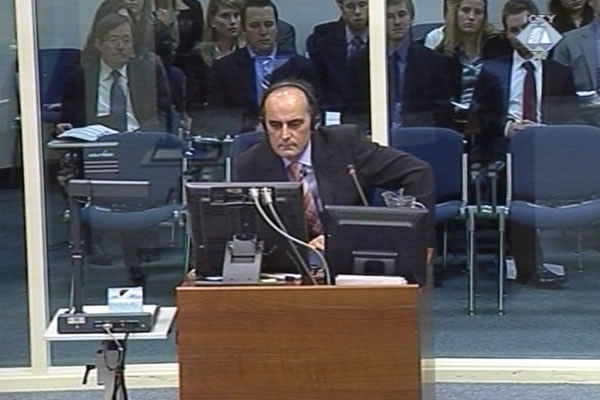Home
POLICE MADE ARRESTS ONLY WHEN THEY DARED
Former chief of the Zadar-Knin Police Administration Ivan Cetina said that in the first month and a half after Operation Storm civilian police had tried to prevent the looting by Croatian soldiers ‘only if they assessed that there would be no confrontation with the perpetrators’. Cetina claims the police did not investigate the murder of five elderly Serbs in the village of Grubori
 Ivica Cetina, svjedok odbrane Ivana Čermaka
Ivica Cetina, svjedok odbrane Ivana Čermaka Ivan Cermak’s defense case continued with the evidence of former chief of the Zadar-Knin Police Administration Ivica Cetina. Cetina spoke about the security situation in the liberated territory after Operation Storm in the summer of 1995. In the statement he gave the OTP investigators in 2001 Cetina recounted that after the arrival of the Croatian troops in Krajina, his police administration urgently set up police stations and made them operational to re-establish law and order. The administration was thwarted in its efforts, because there were numerous crimes in the liberated territory and the police was understaffed. Cetina said the same in the statement he gave the defense in 2009.
Ivan Cermak is in the dock with generals Gotovina and Markac because they allegedly took part in a joint criminal enterprise aimed at expelling Serbs from Krajina. One of the charges against Cermak is that he did not use his influence over military and police units as the Knin Garrison commander to prevent crimes and prosecute perpetrators. In answer to questions by defense counsel Kay, Cetina said that Cermak ‘didn’t impose himself on the police’ and that he didn’t have the authority to manage police work.
Visibly unhappy with the witness's claim that only the military police dealt with the crimes perpetrated by Croatian soldiers, Gotovina’s defense counsel Luka Misetic put it to the witness that under the law, civilian police also could ‘interfere’ in the investigation of crimes perpetrated by soldiers. It was like that on paper, Cetina said, but in practice it ‘was a little bit more difficult’. When the civilian police saw uniformed persons transporting stolen goods, they tried to arrest them and prevent the looting ‘only if they assessed that there would be no confrontation with the perpetrators’. This is how it was for a month and a half after Operation Storm, Cetina said.
The defense counsel then presented several documents that show the opposite was the case, including a MUP report of 14 August 1005 stating that the police arrested three HV members who had tried to steal some tractors. ‘In that particular case we should applaud to the police, we did really well’, the witness said, confirming that the police did what it was supposed to do.
In the cross-examination, prosecutor Mahindaratne noted that there was a case where, in her opinion, the police didn’t do anything to investigate a crime: five elderly Serbs murdered on 25 August 1995 in the Krajina village of Grubori. The Grubori crime is listed in the appendix to the indictment against the Croatian generals. Cetina said that, as far as he knew, that crime was not investigated and that appropriate steps were not taken. He, as the chief of the police administration where the crime occurred, never asked around why there had been no crime scene investigation and why no other effort had been made to investigate the crime.
Ivica Cetina's cross-examination continues tomorrow.
Linked Reports
- Case : Gotovina et al. - "Operation Storm"
- 2009-10-15 "A SUPERIOR DOESN’T COOPERATE, HE ORDERS"
- 2009-10-14 WITNESS: CERMAK HAD NO AUTHORITY OVER POLICE
- 2009-10-12 WHERE THERE USED TO BE 90 PERCENT SERBS, NOW THERE WERE 90 PERCENT CROATS
- 2009-10-30 CERMAK’S ‘REQUESTS’ TO THE POLICE
- 2009-11-02 CROATIAN BUSINESSMEN IN CERMAK’S DEFENSE
- 2009-11-04 KRAJINA, KOSOVO AND NEW ORLEANS: SIMILAR OR DIFFERENT?
